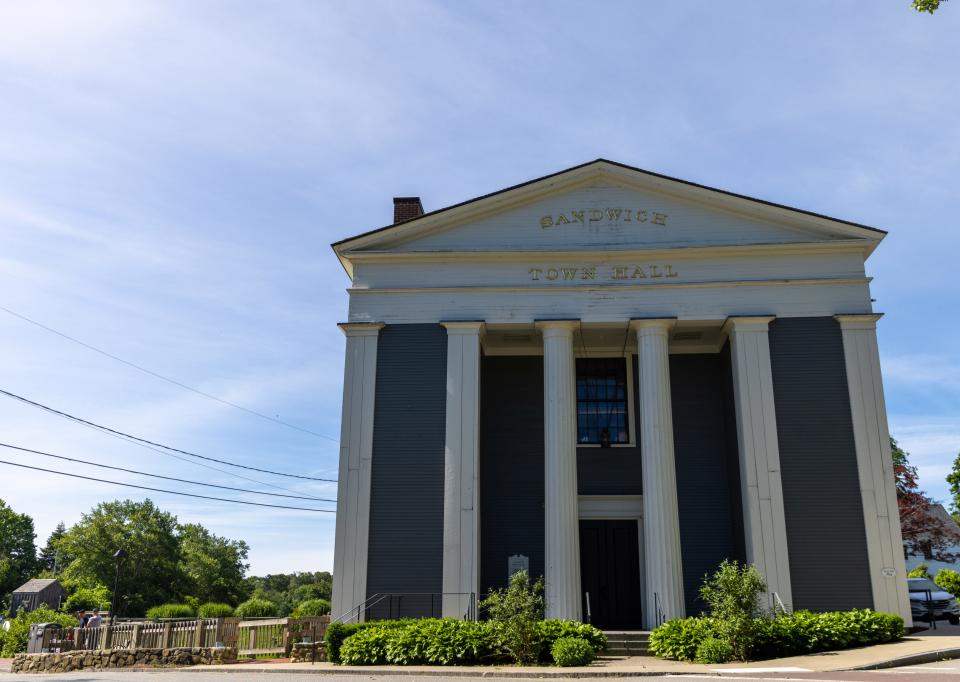Can you insult a town leader in a public meeting? Here's what the state Supreme Court says
"It's common sense," George "Bud" Dunham, Sandwich town manager said. "Treat others the way you would want to be treated. But this court case has befuddled a lot of us."
Dunham is referring to Barron v. Kolenda, a Massachusetts Supreme Judicial Court decision that found the town of Southborough's civility provisions for public comment to be unconstitutional and in violation of Articles 16 and 19 of the Massachusetts Declaration of Rights.
The town's code states, "[a]ll remarks and dialogue in public meetings must be respectful and courteous, free of rude, personal, or slanderous remarks. Inappropriate language and/or shouting will not be allowed.”
In light of the court decision, Dunham said Sandwich, and cities and town officials across the state, will need to adjust aspects of open meeting codes of conduct.

"The case kind of says people can say whatever they want in the way they want to say it during the public comment portion of a meeting," said Dunham. "I think all towns will have to try to figure out what the best way to do that is."
Shane Hoctor, chairman of the Sandwich Board of Selectmen, said two public comment sessions are held during each Select Board meeting – one at the beginning and one at the end. The board, he said, is always prepared to hear from residents – whether their comments are complimentary or critical.
“Public comment is a good thing for the town. We benefit from hearing from the public so we know what’s going on and know what the problems are so we can fix them,” said Hoctor.
But the court decision, he said, has created some anxiety surrounding what he calls "gray areas."
“We are all for free speech,” he said. “But what constitutes free speech in regards to this court decision? What constitutes abusive behavior? What constitutes a threat? How do you differentiate one from another?"

How did this case come about?
The court decision revolves around Southborough couple Louise and Jack Barron, and a third resident, Arthur St. Andre, who filed a lawsuit against members of the Southborough Select Board, the board itself and the town. The plaintiffs said their rights were violated by the board’s actions and that the board violated state Open Meeting Law.
Many of the allegations stem from a Dec. 4, 2018 meeting where Louise Barron and Daniel Kolenda, chairman of the board at the time, had a disagreement. During the meeting, Barron criticized the board during the public comment period. Kolenda said if Barron was going to “slander town officials who are doing their very best,” he was going to stop the public comment section of the meeting.
Barron, who is Jewish, responded by saying, “You need to stop being a Hitler. You’re a Hitler. I can say what I want."
According to the complaint, Kolenda turned off his microphone, called a recess and then verbally attacked Barron.
In April 2020, the Barrons and St. Andre filed a complaint in Superior Court. Worcester Superior Court Judge Shannon Frison ruled in favor of the town, finding that Barron had failed to show Kolenda had deprived her of her rights.
The Supreme Judicial Court took up the case on its own initiative.
In its decision, drafted by Associate Justice Scott Kafker, the high court ruled that a resident has the right to accurately complain about violations of the law committed by town officials and to complain about other town actions. The resident can express views "vehemently, critically and personally," to the government officials, the decision reads.
The decision is a victory for free speech, according to Ruth Bourquin, senior and managing attorney for the Massachusetts chapter of the American Civil Liberties Union, or the ACLU. Members of the public can’t just start talking in the middle of a meeting, said Bourquin, but a person can say what they want if they have been recognized and talk within the allotted time.
"She (Louise Barron) did exactly what she was supposed to do and the Select Board shut her down just because she was criticizing them," said Bourquin. "Criticizing public officials is at the heart of free speech rights."
Public bodies fear the decision will encourage unsavory behavior
When the decision came down, said Bourquin, Southborough town officials considered shutting down public comment altogether. Other public bodies within the state feared the decision could lead to disorderly public meetings, Bourquin said.
"If you get rid of public comment because you don't want to listen to other views, that too could be viewed as retaliation," she said. "That could release a kettle of unconstitutional fish."
To help guide towns and cities, the ACLU released a letter that includes 10 steps that can help cities and towns hold orderly meetings consistent with free speech principles, said Bourquin.
"We tried to give guidance from our perspective on how this can and should be done," she said.
Can residents display disrespectful or harassing behavior?
Dunham said he's aware that civility can be encouraged, but can't be required. But that doesn't mean that town officials will be accepting disrespectful behavior or harassment from the public.
"If someone really crosses a line in terms of harassment or discriminatory words, the chairperson has a right to tell that person to stop and ask them to leave the meeting," he said. "If they refuse, they do have the right to get a law enforcement official to help with that."
Bourquin said open meeting law doesn’t give towns the right to immediately have a law enforcement officer escort someone out.
"If somebody is told to stop talking for reasons that violate this decision and they are still within their allotted time (to speak during public comment), they would be in their rights to verbally express an objection and contact an attorney about it," she said.
Cities and towns should tread lightly, said Bourquin, because the law is now clearly established. "Shutting people down can cause a city or town to pay damages and attorneys fees to that person under our Massachusetts Civil Rights Act," she said. "Hopefully that wont happen too often. If it does, the impacted people will have legal recourse."
How will Sandwich address the court decision?
The first step many town officials across the state took, said Dunham, was to learn about the court case, as well as its outcome through a series of webinars provided by the Massachusetts Municipal Association.
The first webinar, moderated by Dunham and held June 5, attracted about 450 participants.
"It's the highest amount of people that's ever signed up for a webinar," said Dunham. "It shows you that cities and towns across the state are trying to make head or tails of what the decision was and how it impacts them."
To shield themselves from disrespectful behavior and to set an example, many local boards and committees had already adopted codes of conduct and rules of decorum. Sandwich developed its open meeting code of conduct in 2007, said Dunham. The protocols were then amended in 2017.
"When the Select Board adopted codes of conduct years ago, it automatically applied to all appointed committees and then elected boards and committees in town had the choice of whether or not they wanted to adopt it," he said. "And the vast majority of elected committees did."
But the court decision changed the rules of engagement, he said.
“The court and the state have not issued any guidance on this yet and recommended (codes of conduct) changes haven’t been finalized by the MMA," he said. "There’s not a ton we need to change but certainly some aspects of our policies that should change."
Disrespectful behavior has been on the rise.
At the June webinar sponsored by the Municipal Association Dunham discussed decorum and civility with participants.
"It’s getting harder, not easier, to work in public service and municipal government,” he said during the event. In general, said Dunham in a telephone interview, greater levels of disrespect have evolved in every facet of society. Inconsiderate behavior hurts public service, he said.
"We’ve experienced way more (disrespectful behavior from town residents) in the last five years than the prior 20," he said. "A lot of that is due to mental health issues, and social media bashing that makes its way to public meeting."
While he can't think of the last time the Sandwich Select Board had to cut someone off during the comment portion of a municipal meeting, the town moderator has had to occasionally ask someone to leave or to stop yelling. A lot of the tension, said Dunham, came to a head during the COVID-19 pandemic.
"People were cooped up for so long, and I think they were getting frustrated. It’s happening in all walks of society, not just during town meetings," he said.
"I think we all are just trying to figure out what the best way is to balance respect and the town's liability," he said.
Rachael Devaney writes about community and culture. Reach her at rdevaney@capecodonline.com. Follow her on Twitter: @RachaelDevaney.
Thanks to our subscribers, who help make this coverage possible. If you are not a subscriber, please consider supporting quality local journalism with a Cape Cod Times subscription. Here are our subscription plans.
This article originally appeared on Cape Cod Times: Supreme Judicial Court decision may change Cape Cod public comment

